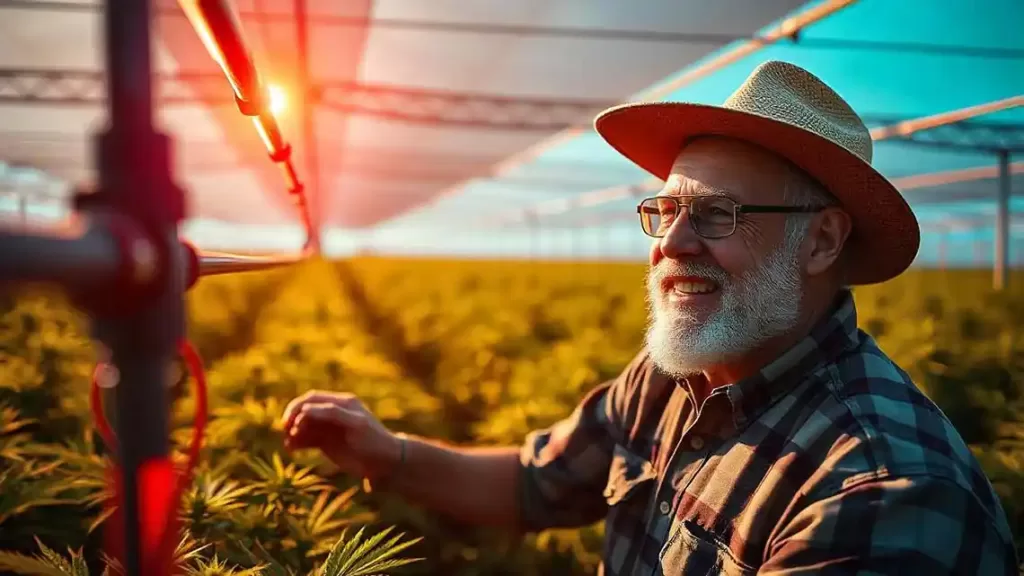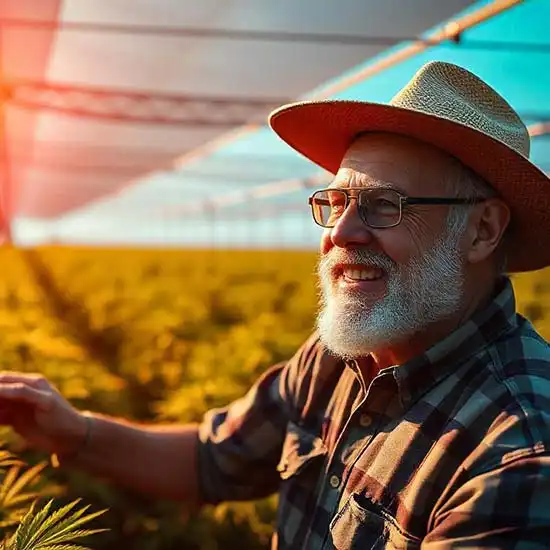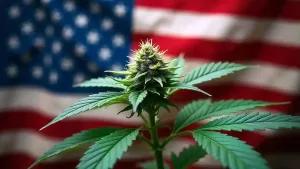As we approach National Farmers Day on October 12, we take the opportunity to recognize the dedicated cannabis farming individuals who work tirelessly to bring nature’s most versatile and therapeutic plant—cannabis—to the world. Farmers are the unsung heroes of the cannabis industry. They tend to the plant from seed to harvest, shaping the quality of our products. Their work underpins both the medical and recreational use of cannabis, ensuring we have access to strains that meet our needs, whether for pain relief, relaxation, or creativity.
In this blog, we’ll explore the essential role that cannabis farmers play in the industry, the sustainable practices they use, and why supporting local cannabis growers is critical. We’ll also take a moment to reflect on World Mental Health Day (October 10), highlighting how cannabis can support mental wellness.
The Role of Cannabis Farmers in the Industry
Cannabis farming goes beyond simply growing plants—it’s a highly specialized form of agriculture. It demands deep knowledge of horticulture, strain genetics, and environmental factors. Farmers must balance multiple variables to ensure their plants grow in optimal conditions. They carefully monitor soil quality, water levels, light exposure, and the health of each plant. These efforts result in the production of high-quality cannabis, with characteristics that can differ significantly from one strain to another.
Why Farmers Matter in the Cannabis Supply Chain
Cannabis farmers are at the foundation of the industry. Without their skill and care, dispensaries like 7 Engines wouldn’t have the wide selection of premium products available to customers. Whether it’s high-THC varieties like Blue Dream or CBD-rich strains, cannabis farmers ensure there’s something for every need and preference. The quality of the final product begins at the farm, and the farmers are responsible for ensuring the best possible yield.

Sustainable Farming Practices in Cannabis Cultivation
One of the key challenges cannabis farmers face today is sustainably growing the plant. The cannabis plant requires significant resources, and traditional farming methods can put a strain on the environment.
However, many farmers are in charge of implementing eco-friendly practices to minimize their impact on the planet.
1. Water Conservation Techniques
Cannabis is a water-intensive crop, but farmers are increasingly turning to water conservation practices such as drip irrigation systems. This method delivers water directly to the plant’s root system, reducing water waste and promoting healthier growth.
2. Organic Growing Methods
Many cannabis farmers opt for organic farming methods to reduce the use of chemical fertilizers and pesticides. Instead, they rely on natural fertilizers like compost or manure and beneficial insects to protect crops from pests.
3. Renewable Energy Sources
In regions where cannabis cultivation occurs indoors, energy consumption can be significant. Farmers are transitioning to renewable energy sources, such as solar panels, to power their operations. This shift not only reduces carbon footprints but also lowers production costs, benefiting both farmers and consumers.
4. Sustainable Packaging
Some cannabis farmers and brands are taking their sustainability efforts beyond cultivation. By using eco-friendly packaging—made from biodegradable or recyclable materials—they reduce the environmental impact of cannabis production even further.
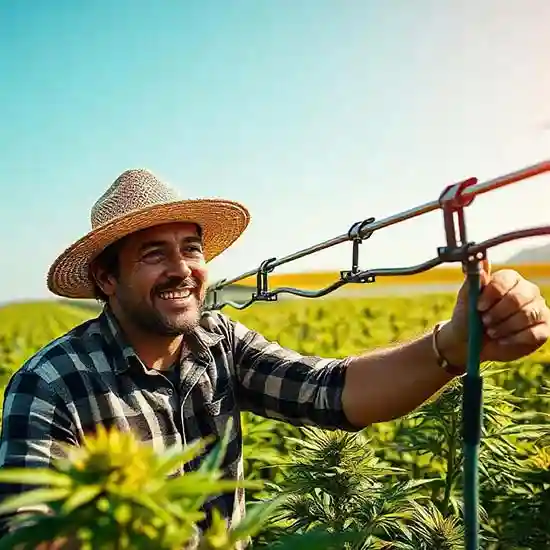
Supporting Local Cannabis Farmers
Supporting local cannabis farmers is more than just a choice—it’s a responsibility. Buying from local farms ensures that your cannabis is fresh, high-quality, and sustainably grown. Local cannabis farmers are often small business owners who pour their passion into every aspect of cultivation. Purchasing their products not only helps the local economy but also contributes to a more transparent and accountable supply chain.
By choosing products grown by local farmers, you help:
- Promote environmentally friendly farming practices
- Ensure a healthier, more consistent product
- Support local jobs and economies
When you shop at 7 Engines, you’re not only getting top-tier cannabis products, but you’re also supporting farmers who make quality and sustainability a priority.

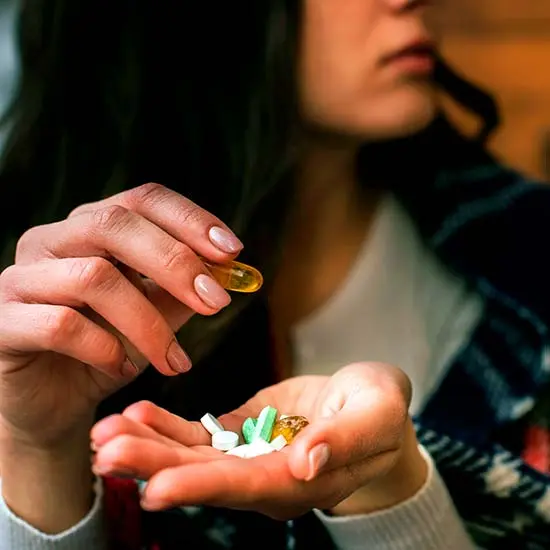
How Cannabis Farmers Can Support Mental Health: World Mental Health Day
As we celebrate World Mental Health Day on October 10, it’s worth considering how cannabis can support mental health. Mental health is a pressing issue worldwide, with millions of people affected by conditions such as anxiety, depression, and stress. Cannabis, when used responsibly, can be a valuable tool in managing certain mental health challenges.
1. Cannabis for Anxiety and Stress
Cannabis has been shown to have anxiolytic (anxiety-reducing) properties, especially strains high in CBD. Many people turn to cannabis to unwind after a stressful day or manage chronic anxiety. It can help induce relaxation and reduce the physical symptoms of stress, such as muscle tension.
2. Cannabis and Depression
While cannabis is not a cure for depression, certain strains can provide temporary relief from the symptoms. Sativa-dominant strains, known for their uplifting effects, may help elevate mood and boost energy levels, offering a short-term reprieve from depressive states.
3. Sleep and Mental Health
Adequate sleep is crucial for maintaining mental well-being, and cannabis can play a role in improving sleep quality. Indica strains are commonly used for their sedative properties, helping individuals with insomnia or sleep disturbances get a restful night’s sleep. Better sleep leads to better mental health.
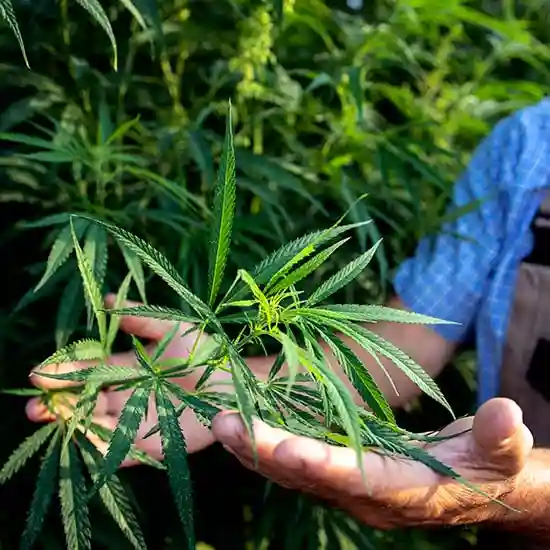
The Evolution of Cannabis Farming in the U.S.
Cannabis farming in the United States has a long and complex history, deeply intertwined with social, political, and economic shifts. From its early days as a valuable crop to its current status as one of the most debated plants in modern agriculture, cannabis cultivation has undergone significant changes. Let’s look at the key moments in the history of cannabis farming in the U.S., from its origins to its modern-day resurgence as a major agricultural force.
Early Days: Hemp as a Staple Crop
Cannabis was first introduced to North America by settlers in the early 1600s, primarily in the form of hemp. Hemp, a variety of cannabis with low THC content, was an important crop for its use in textiles, rope, and sails. In fact, in colonial times, several colonies such as Virginia and Massachusetts mandated hemp cultivation by law, recognizing its economic value for building materials and fabric.

Cannabis was first introduced to North America by settlers in the early 1600s, primarily in the form of hemp. Hemp, a variety of cannabis with low THC content, was an important crop for its use in textiles, rope, and sails. In fact, in colonial times, several colonies such as Virginia and Massachusetts mandated hemp cultivation by law, recognizing its economic value for building materials and fabric.
Prohibition and the Decline of Cannabis Farming
Despite its widespread use, attitudes toward cannabis began to shift in the early 20th century, particularly as more psychoactive varieties of cannabis, often referred to as marijuana, gained popularity in certain communities. The Marihuana Tax Act of 1937, under President Franklin D. Roosevelt, marked the beginning of cannabis prohibition. While initially aimed at curbing recreational marijuana use, it also placed heavy restrictions on hemp production, making it nearly impossible for farmers to continue cultivation.
World War II briefly revived hemp farming in the U.S. under the “Hemp for Victory” campaign, which encouraged farmers to grow hemp for the war effort. Hemp fibers were needed for uniforms, ropes, and parachutes, and the government even produced propaganda films to promote its cultivation. However, following the war, restrictions resumed, and hemp farming once again declined sharply.

The War on Drugs: Cannabis Stigma Grows
By the 1960s and 70s, marijuana became associated with countercultural movements. The Controlled Substances Act of 1970, signed by President Richard Nixon, classified cannabis as a Schedule I drug, placing it in the same category as heroin and LSD.
This classification essentially criminalized all forms of cannabis cultivation. Farmers who once grew hemp as an agricultural crop were now faced with the prospect of legal penalties.
During the Reagan era in the 1980s, the War on Drugs intensified the crackdown on cannabis farming. Law enforcement targeted illegal cannabis grow operations, and farmers who defied the ban were subject to raids, arrests, and property seizures. The stigma surrounding cannabis farming was firmly established, and the once-prominent crop was driven underground.
The Resurgence: Medical Marijuana and the Hemp Revival
The 1990s marked a turning point for cannabis farming, thanks to the rise of the medical marijuana movement. In 1996, California became the first state to legalize cannabis with the passage of Proposition 215. Other states soon followed, and cannabis farming, particularly indoor and small-scale growing operations, began to reemerge from the shadows.
At the same time, interest in hemp began to grow once again. The 2014 Farm Bill, under President Barack Obama, allowed states to conduct hemp research and pilot programs. This effectively lifted the decades-long ban on hemp cultivation. By 2018, the Farm Bill fully legalized hemp at the federal level, defining it as cannabis with less than 0.3% THC. This allowed farmers across the U.S. to cultivate hemp for industrial purposes, as well as for CBD production. CBD, by now had surged in popularity for its therapeutic properties.

Modern-Day Cannabis Farming: A Thriving Industry
Today, cannabis farming is experiencing a renaissance, particularly in states where recreational and medical cannabis has been legalized. States like California, Colorado, and Oregon are at the forefront of this agricultural revolution. These states are home to large-scale grow operations producing cannabis for both local markets and export.
Modern cannabis farming incorporates cutting-edge technology, including indoor growing, hydroponic systems, and advanced genetics to develop new strains. Sustainability is also a major focus, with many cannabis farmers adopting eco-friendly practices. Organic growing, solar power, and water conservation reduce the environmental impact of cannabis cultivation.

In 2021, the legal cannabis industry in the U.S. was valued at over $25 billion! With more states moving toward legalization, the demand for high-quality cannabis is expected to grow exponentially. Farmers now have the opportunity to cultivate both THC-rich cannabis for recreational use and CBD-heavy strains for medical and wellness products. Hemp farming, too, has seen a resurgence, with applications in everything from biofuels to construction materials.
Challenges and Opportunities for Modern Cannabis Farmers
While the future looks bright for cannabis farming, challenges remain. Federal legalization has not yet been achieved, leaving farmers in a complex legal landscape. Additionally, cannabis cultivation requires significant investment in infrastructure, particularly for indoor operations, and regulations can vary widely from state to state.
However, with growing public support for legalization and increasing demand for cannabis products, the opportunities for farmers are immense. Cannabis farming has evolved from a banned and stigmatized activity into one of the most dynamic and promising sectors of U.S. agriculture.

Cannabis and Farming: The Future
As the cannabis industry continues to grow, the role of farmers will remain critical. The future of cannabis cultivation is likely to see even more advancements in sustainable practices, as well as the introduction of new strains tailored to specific medical or recreational needs.
Farmers are also expected to play a key role in shaping the legal landscape of cannabis, with federal legalization potentially on the horizon. Cannabis farmers will need to navigate new regulations while continuing to innovate their cultivation methods and product offerings.
Conclusion
As we celebrate National Farmers Day and World Mental Health Day, we recognize the significant contributions of cannabis farmers and the plant’s potential to support mental well-being. Farmers are the cornerstone of the cannabis industry, providing us with high-quality strains that help people manage their health, creativity, and relaxation.
At 7 Engines, we take pride in offering products that are not only effective but also sustainably sourced from passionate cannabis farmers. Whether you’re using cannabis for its medicinal benefits or just to unwind, remember the role that farmers play in delivering a product that supports your well-being.
In addition to their contributions to the cannabis industry, farmers also support efforts toward sustainability, ensuring that we can enjoy cannabis responsibly. On World Mental Health Day, we reflect on how cannabis can play a role in supporting mental wellness and helping individuals manage stress, anxiety, and other challenges. With responsible use and quality products from 7 Engines, cannabis can enhance both your physical and mental health.
As we move forward, let’s continue to support local farmers and explore the mental health benefits that cannabis can offer, ensuring a better future for everyone involved in the industry.
The information provided is not a substitute for professional medical advice, diagnosis, or treatment. Consult with a qualified healthcare professional for personalized advice based on your medical condition.

